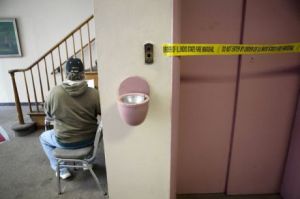“There was an elevator malfunction… Our security team responded to the incident immediately… All guests were safely evacuated… We are ensuring the elevator car in question undergoes a thorough inspection…”
 Â They got into an elevator and headed down from the rooftop terrace, but when another couple got in on the 16th floor, the compartment dropped and plummeted eight floors before stopping.
 They got into an elevator and headed down from the rooftop terrace, but when another couple got in on the 16th floor, the compartment dropped and plummeted eight floors before stopping.
The group, which also included British actor Guy Burnet, actress Rosie Fellner and comedian Seth Herzog, was leaving the afterparty for new movie Janie Jones at the Gramercy Park Hotel in Manhattan on Thursday night (27Oct11).
Janie Jones director Rosenthal tells Nymag.com, “We’ve all had a couple of drinks… and we’re just piling into the elevator… Everyone is yelling and hooting… (The couple) decide to jump in, and as soon as they jump in, the thing starts plummeting down. His girlfriend is lucky she didn’t get killed because her foot was barely inside the door when the elevator dropped. I think we fell eight stories before the emergency brake went off. We initially thought we’d gone all the way to the basement and bounced on the springs.”
Emergency services were called to the scene, but the frustrated group decided not to wait, and took action themselves, climbing out of a gap in the doors onto a floor.
For more:Â http://www.hollywood.com/news/Actors_trapped_in_elevator_fall/8028652









